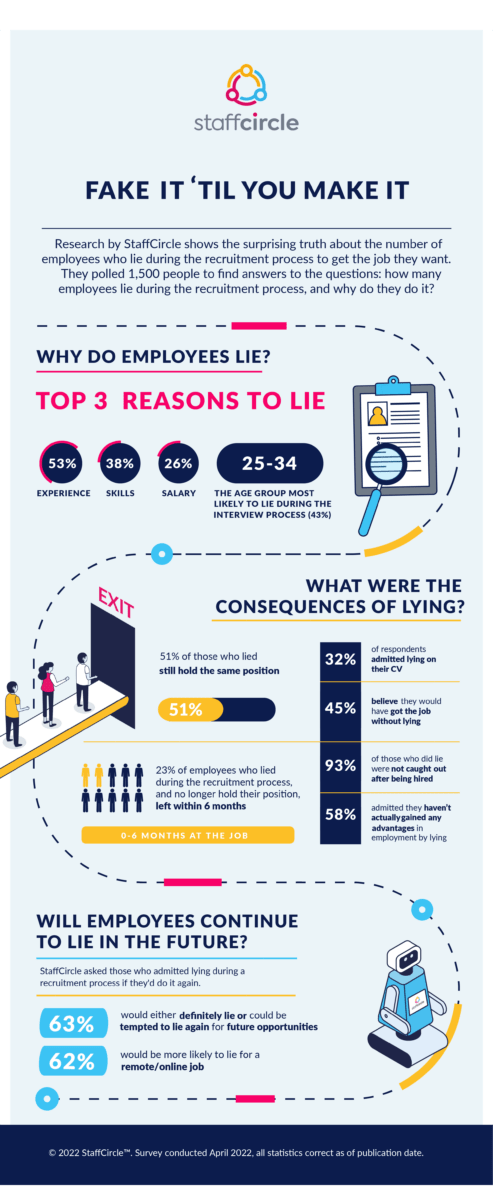
2022 Survey Results Reveals the UK’s Habits About Lying During the Interview Process

Getting a job and passing all the various interview stages is one of the most rewarding achievements for an employee. However, for some people, they might think the only way to progress through those stages is to fabricate certain truths.
As mentioned in a recent survey by StaffCircle, out of 1,500 respondents, 32% declared that they had lied on their CVs. But is it truly unharmful and offensive? Is it worthwhile to take the chance to have a better career path? What happens if you’re caught? Let’s see.

What were the most prevalent lies?
25–34 is the age group that most commonly lies in the interview process, and the findings show that the most typical lies given during interviews are:
Experience
One of the most frequent things an applicant lies about in an interview and on their CV is falsifying academic credentials. A potential employer can now confirm your educational background in several ways.
Typically, you will be required to provide confirmation of your credentials in the form of award certificates or transcripts. Additionally, they can contact your academic advising or make use of a service that verifies degrees. The survey found that 53% of participants admitted to lying to hide their lack of experience.
Skills
It is simple for people to claim that they are an expert in everything on paper. However, demonstrating that they actually have these abilities is a quite different matter. Most employers use assessment tasks as a part of their hiring process to determine whether they have the abilities, qualifications, and experiences they are professing to have.
If people perform poorly on such examinations, they may be accused of exaggerating the truth or overestimating their ability, both of which could lead to their disqualification from further interview stages or be sacked entirely.
If a lack of experience isn’t the issue for employees, their narrow skill set can prevent you them landing an interview. 38% of respondents acknowledged lying about their skill level.
Salary
26% of respondents said they had lied about their prior salary. They can negotiate a greater starting pay in a new career by claiming they made a little more in their previous job than they actually did, but this is not recommended.
However, it is undoubtedly the one that poses the greatest risk of all the typical lies. Through referrals from the former job, a company might quickly confirm a candidate’s prior income.
Can People Get Fired for Lying In An Interview?
Yes, is the clear-cut response. Companies have the legal ability to fire employees who are caught lying, though there should be certifiable evidence the employee has lied.
Consider a scenario in which they lied about their prior experience on their CV, got the job, and were later exposed. They might be fired if the falsehood was severe enough to violate the implied duty of confidence and trust that existed in between them and the employer.
This is because if it proves that you lack the qualifications for the position, and it can harm the company’s productivity and reputation.
Why Do People Take the Risk?
93% of responders who told lies claimed they hadn’t been caught. When they took part in the survey, 40% of the participants were still employed in the same job where they lied.
Although so many respondents have admitted to lying on their resumes, 58% of respondents believed that they gained nothing from lying on their CV. Additionally, 45% of respondents also believed that they might have gotten the job without lying during the interview process.












































